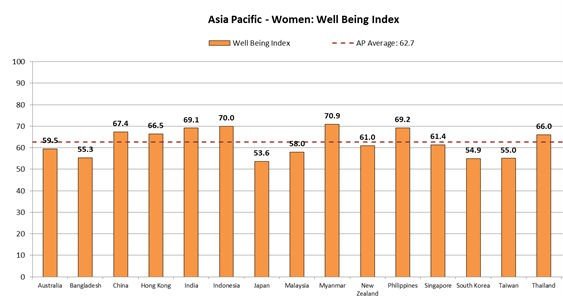MANILA – Out of 16 countries in the Asia Pacific region, Filipino women have made the most progress in terms of leadership in the government and private sector, according to MasterCard’s Index of Women’s Advancement.
The index measures the socioeconomic standing of women across Asia Pacific, through three main indicators: employment, education, and leadership.
The Philippines ranked third in the index with a score of 72.9, following New Zealand with 77.9, and Australia with 76. According to MasterCard, the Philippines made the most progress towards gender equality over the last year.
The index revealed that women in the Philippines scored an increase of 4.6 index points in their leadership score, from 46.1 in 2013, to 50.7 in 2014.
Filipino women also lead in terms of business leadership, with 50 women in leadership positions for every 100 men.

The Index of Women’s Advancement was revealed along with MasterCard’s Index of Well-Being for Women, which was released in celebration of International Women’s Day.
Women in the Philippines emerged with the third highest index score in the region with 69.2, following Myanmar (70.9), and Indonesia (70). A higher score reflects a more optimistic outlook from respondents on their own well-being.
For the index, MasterCard asked female respondents 21 questions pertaining to five categories: work and finances, safety from threats, satisfaction, personal well being, and voice.
Filipino women scored highest in the work and finances category, with a score of 85.1 in the employment subcategory, and 84.5 in the regular income subcategory.
The index revealed that women from emerging countries tend to have more positive views of their own well-being when compared to their developed counterparts. On average, the seven developed markets surveyed featured lower scores (average 58.9) than emerging markets (average 65.7).
Women in developed APAC markets ranked marginally higher in only one component of the survey–‘safety from threats’–with a score of 57 compared to 55.2 for emerging markets.
In all other components, women from emerging markets scored higher, with the greatest discrepancy apparent in the ‘satisfaction’ component (69.9 vs. 59) and ‘personal well-being’ (67.4 vs. 55).
“At first glance, the contrast in scores between developing and emerging markets seems to suggest that a higher standard of living may not necessarily translate to a higher sense of well-being as there are other influences involved such as cultural or psychological ones,” said Georgette Tan, group head, Communications, Asia/Pacific, Middle East and Africa, MasterCard.
Women in emerging markets are also clearly more optimistic about their work and finances including their outlook on regular income and employment. In comparison, women from developed markets appear to be in greater control when it comes to keeping up with their bills or saving for big purchases, possibly due to the better margins afforded by their higher incomes.








